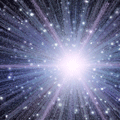068 - En el principio… (1/3)
068 - Am Anfang... (1/3)
068 - In the beginning... (1/3)
068 - Au commencement... (1/3)
068 - In principio... (1/3)
068 - Pradžioje... (1/3)
068 - No princípio... (1/3)
068 - В начале... (1/3)
068 - На початку... (1/3)
En el principio…
In the beginning…
LOCUTORA
En el principio fue la Gran Explosión.
In the beginning was the Big Bang.
В начале был Большой взрыв.
Desde hace 15 mil millones de años el Universo existe y se expande.
For 15 billion years the Universe exists and expands.
Вот уже 15 миллиардов лет Вселенная существует и расширяется.
LOCUTOR
ANNOUNCER
200 mil millones de galaxias pueblan el espacio y el tiempo.
200 billion galaxies populate space and time.
200 миллиардов галактик населяют пространство и время.
LOCUTORA
Una de ellas es la Vía Láctea.
One of them is the Milky Way.
Один из них - Млечный Путь.
LOCUTOR
200 mil millones de estrellas gravitan en su brillante espiral.
200 billion stars gravitate in its bright spiral.
200 миллиардов звезд движутся по его яркой спирали.
LOCUTORA
Una de ellas, amarilla y mediana, es el Sol.
One of them, yellow and medium, is the Sun.
Один из них, желтый и среднего размера, - это Солнце.
LOCUTOR
La estrella más cercana al Sol es Alfa Centauri.
The closest star to the Sun is Alfa Centauri.
Ближайшая к Солнцу звезда - Альфа Центавра.
Se encuentra a 40 millones de millones de kilómetros.
It is 40 million million kilometers away.
Он находится на расстоянии 40 миллионов миллионов миллионов километров.
LOCUTORA
Llegaríamos a ella después de cuatro años y tres meses cabalgando un rayo de luz.
We would reach her after four years and three months riding a beam of light.
Мы доберемся до него через четыре года и три месяца на луче света.
LOCUTOR
La Luna tarda un mes girando en torno a la Tierra.
The Moon takes a month revolving around the Earth.
Чтобы сделать оборот вокруг Земли, нужен месяц.
LOCUTORA
La Tierra tarda un año en torno al Sol.
The Earth takes a year around the Sun.
Земля совершает оборот вокруг Солнца за один год.
LOCUTOR
El Sol, 220 millones de años en torno al disco incandescente de la Vía Láctea y a su inquietante agujero negro.
The Sun, 220 million years around the incandescent disk of the Milky Way and its disturbing black hole.
Солнце, 220 миллионов лет вокруг раскаленного диска Млечного Пути и его жуткой черной дыры.
LOCUTORA
La Tierra cumple su órbita a 108 mil kilómetros por hora.
The Earth meets its orbit at 108 thousand kilometers per hour.
Земля совершает оборот по орбите со скоростью 108 тысяч километров в час.
LOCUTOR
En los bordes del Universo, los quásares se desbocan a casi 300 mil kilómetros por segundo.
On the edges of the Universe, quasars runate at almost 300 thousand kilometers per second.
На краях Вселенной квазары бушуют со скоростью почти 300 000 километров в секунду.
Los observamos hoy tal como brillaban en el alba de las galaxias.
We observe them today as they shone at the dawn of the galaxies.
Мы наблюдаем их сегодня, как они сияли на заре галактик.
LOCUTORA
Nuestro planeta, el tercero a partir del Sol, se condensó hace 4 mil 600 millones de años.
Our planet, the third from the Sun, condensed 4,600 million years ago.
Наша планета, третья планета от Солнца, сконденсировалась 4,6 миллиарда лет назад.
LOCUTOR
Polvo de estrellas, moléculas complejas liberadas por supernovas alcanzaron la naciente Tierra.
Stardust, complex molecules released by supernovae reached the nascent Earth.
Звездная пыль, сложные молекулы, выпущенные сверхновыми, достигли зарождающейся Земли.
LOCUTORA
Al poco tiempo, aparecieron en el agua los primeros replicadores, formas ancestrales de la vida.
Soon, the first replicators, ancestral forms of life, appeared in the water.
За короткое время в воде появились первые репликаторы - древние формы жизни.
LOCUTOR
Las algas verdiazules aprendieron a comer luz y llenaron los océanos.
The blue-green algae learned to eat light and filled the oceans.
Сине-зеленые водоросли научились есть свет и заполнили океаны.
LOCUTORA
Después de centenares de millones de años las células errantes se asociaron en colonias.
After hundreds of millions of years the wandering cells became associated in colonies.
Спустя сотни миллионов лет блуждающие клетки объединились в колонии.
LOCUTOR
Ellas inventaron el sexo y su inevitable compañera, la muerte.
They invented sex and their inevitable companion, death.
Они изобрели секс и его неизбежную спутницу - смерть.
LOCUTORA
En los mares del Cámbrico y en los continentes emergidos estalló la diversidad.
Diversity broke out in the Cambrian seas and on the emerging continents.
Разнообразие резко возросло в кембрийских морях и на образовавшихся континентах.
LOCUTOR
30 mil millones de especies han vivido durante la historia de la Tierra y sobre su frágil envoltura sólida.
30 billion species have lived during Earth's history and its fragile solid envelope.
30 миллиардов видов обитали на протяжении истории Земли и на ее хрупкой твердой оболочке.
LOCUTORA
La Naturaleza fue seleccionando, con paciencia de relojero, las que mejor se adaptaban al entorno.
Nature was selecting, with watchmaker's patience, the ones that best suited the environment.
Природа с терпением часовщика отбирала те, которые лучше всего подходили к окружающей среде.
LOCUTOR
Hace 65 millones de años un meteorito gigante aniquiló a los dinosaurios y a una multitud de seres vivos.
65 million years ago a giant meteorite annihilated dinosaurs and a multitude of living beings.
65 миллионов лет назад гигантский метеорит уничтожил динозавров и множество живых существ.
LOCUTORA
Por esta casualidad, prosperaron los mamíferos.
By this chance, mammals thrived.
По этой случайности млекопитающие процветали.
CONTINUARÁ…

